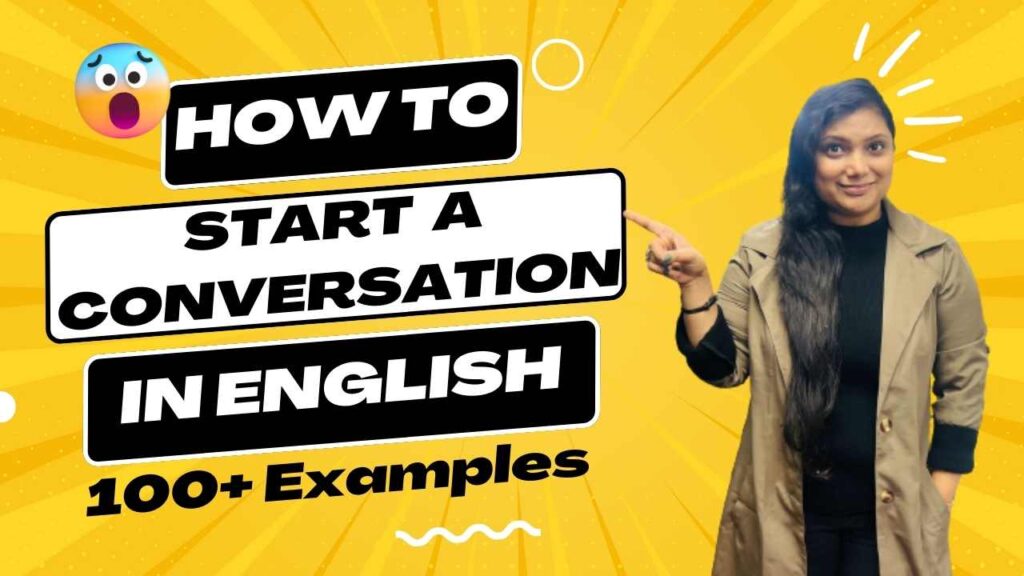Hey there! What is the most effective way to start a conversation in English? That is the most common question I receive.
There are probably a lot of you who have similar questions. This blog is my attempt to answer that question.
Striking up a conversation can be challenging, and we all want to avoid awkward silences. The success of business meetings and personal meetings in English depends on having a conversation strategy. The following tips will help you use English in conversation, regardless of who is present, how much you know about English grammar and vocabulary, or whether you are still learning English:
Icebreakers

There is nothing more nerve-wracking than not knowing a person and not knowing whether or not to speak to them. Our fear of communicating with strangers in English is usually a result of our fear of people thinking we aren’t intelligent. It is the same with me when I speak foreign languages. This is a completely natural process. Nevertheless, I find it easier to join a conversation that has already begun.
An icebreaker is a phrase that helps initiate a conversation. If you’re wondering what to say when you meet new people, an icebreaker may be the answer. Here are some questions, phrases, and expressions you can use to confidently begin conversations with anyone.
Simple General Conversation Starters

Beginning a conversation with the basics is usually a good idea:
- What’s your name?
- Where are you from?
You could also introduce yourself to start a conversation:
- I’m Riya from India. Where are you from?
- Hi! I’m Riya Sharma. What’s your name?
You could also begin the conversation by mentioning something that is going on at the time or place of the meeting:
- There is too much music playing here. Hi! I’m Riya. What’s your name?
Alternatively, you could start a conversation by finding something in common:
- Who are our mutual acquaintances?
- What brings you here?
- Do we know each other?
- What do we have in common?
A compliment is also a good way to start a conversation:
- It’s a great jacket. Where did you get it? I’m Riya, by the way.
- Your English is excellent! Hi! I’m Riya. What’s your name?
Alternatively, you could ask a question such as:
- How do you make a living?
- From where are you originally from?
English Speaking Starting Words

- Hey!
- Hi!
- Hello!
- Yo!
- Sup?
- G’day!
- Howdy!
How to Start a Conversation in English in an Informal Way
- Hey, what’s up?
- What’s going on?
- Is everything all right?
- What’s crackin’?
- How’s it going?
- How have you been?
- What have you been up to?
- How are you doing?
- How are things?
Start a Conversation in English: How to Talk to People You Don’t Know
Getting the conversation started
Impersonal questions are the most effective way to initiate a conversation with someone you don’t know. We can connect our questions to events around us, for example:
- Do you mind if I sit here?
- I really like your shoes. Where did you get them?
- Excuse me, do you know what time it is?
- Could you tell me when this shop will close?
Adding Details
Now that the conversation has begun, you need to establish a topic. To do this, you must provide details about the topic and discuss different aspects or parts of it.
- Did you enjoy it?
- Is that restaurant near here?
- The reason I ask is because I’ve been thinking about watching that film.
- Thanks for the suggestion!
- I’ve been looking for an affordable Thai restaurant around here.
- I appreciate you telling me about that!
Questioning
When you want to have a long conversation, you’ll probably want to learn more about the person you’re talking to. You’ll want to ask general questions and seek out topics of common interest to keep the conversation going.
- Are you a frequent visitor to these places?
- What made you come here today?
- In what field do you work?
- Do you live in the area?
- Can you tell me where you live?
Switching topics of conversation
Once you have found a topic that both of you are comfortable discussing, you should switch topics to take the conversation deeper.
- It’s such a coincidence! The same goes for me!
- I’m a dog lover! How many dogs do you have?
- That’s impossible! Previously, I lived in Boston as well!
Getting opinions to Start a Conversation in English
A deeper conversation can also be started by asking for someone’s opinion on a particular subject. Almost everyone has an opinion and is willing to share it with others.
- Do you have any experience with this website?
- Unlisted numbers calling me? Do you think that’s okay?
- Honestly, I don’t know. Is it a good idea?
Changing the direction of the Start a Conversation in English
It is likely that, after the initial buzz of an interesting interlocutor has worn off, you will want to mention something that is tangentially related to the topic at hand.
- When it comes to great films, have you ever seen…?
- Yes, that’s right! Do you know what else happened?
- I see! Ah, that reminds me…
Permission to continue the Start a Conversation in English
After talking with someone for a while, it’s polite to check and see if they would like to continue. In order to ensure that they aren’t acting politely, you should get confirmation from them.
- If you have to leave, let me know. You don’t need to worry about me.
- Was it a bad time for me to catch you?
- There’s probably something you’re working on right now. Are you free to chat?
The Start a Conversation in English Is Wrapped Up
In order to have a good conversation, it is important to know when to stop talking. It is best to talk about future plans when transitioning out of a conversation.
- I look forward to seeing you again if you’re in town!
- It’s been a pleasure chatting with you. Thanks a lot!
- Feel free to get in touch again on Friday if you’d like.
- Thank you for taking the time to meet with me!
- Let’s keep in touch!
How to Start a Conversation in English : Imperatives and Sentences

The term imperative refers to a command. Orders and instructions are given using the form of the verb. We should be careful when using imperatives because they can sound direct, forceful, or rude in many situations.
- Let’s talk about something.
- Please share something interesting with me.
- I want to hear your story.
- Please tell me a little about yourself.
Check out Part 2 of How to Start a Conversation in English – 100+ Examples
Anju Jindal’s English Speaking Course
Why should you take the Anju Jindal English Speaking Course?
- Do you lack confidence when expressing your ideas?
- Are you nervous when you speak English?
- Are regional languages a barrier to learning?
- Is it embarrassing to face your colleagues?
- When you are having a conversation, do you feel shy?
- Is there a lack of exposure in the recent past?
- Do you lack a good vocabulary?
- Does incorrect grammar pose a barrier to learning?
- Are you unable to converse fluently in English?
Why join Anju Jindal’s English Speaking Course?
- 17+ years of experience in Soft skills & career development Training.
- trained 10000+ Students and professionals who are confidently working and have growing careers.
- Industry Exposure.
- Learning by activities.
- passionate to teach.
- Confidence building day by day.
- Practical ways to make English your habitual language.
- Lifetime community support.
- Additional content in the form of video libraries and blogs.
After Anju Jindal’s English-speaking course
- One can comprehend and use simple expressions and phrases related to concrete needs
- Can introduce themselves and others and ask and answer questions about personal details such as where they live, people they know, and things they own.
- One can interact easily when the other person talks slowly and clearly and is willing to provide assistance.
- Can comprehend simple sentences and common expressions related to immediate interests (such as basic personal information, shopping, local geography, and employment).
- Communicates well in simple, routine activities requiring simple and direct information exchange.
- Can explain simple terms like their background, immediate environment, and immediate needs.



